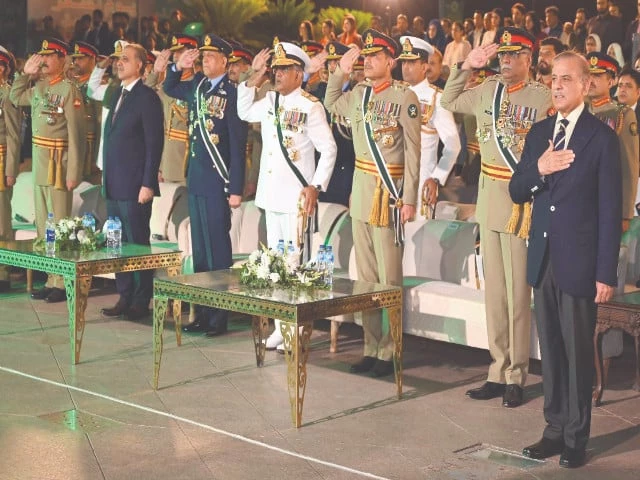Prime Minister Shehbaz Sharif has urged India to set aside their differences and embrace a future as peaceful neighbors. He made this call during the nationwide Youm-e-Tashakur celebrations, marking Pakistan’s significant victory over India in Marka-e-Haq.
While speaking at a ceremony at the Pakistan Monument, the prime minister emphasized the importance of both countries coming together to discuss the Jammu and Kashmir issue, which he believes is crucial for lasting peace in the region.
He expressed Pakistan’s desire to coexist peacefully, stating that the choice lies with both nations to either foster a friendly relationship or continue down a different path. “Pakistan and India have fought three wars without gaining anything,” he remarked, adding, “We need to engage in dialogue about Kashmir, trade, and terrorism.”
He shared that Pakistan had suffered the loss of 90,000 lives in the fight against terrorism, along with economic damages amounting to $150 billion. He described Youm-e-Tashakur as a significant moment in history, where the nation came together to honor the achievements of Pakistan’s armed forces against India. This occasion followed a painful chapter in Pakistan’s past, recalling the events of 1971, which had deeply affected the country.
The prime minister mentioned that during Marka-e-Haq, millions of Pakistanis were united in prayer for the courageous officers and personnel of the navy, air force, and army, hoping that the enemy would never dare to threaten Pakistan again.
He also pointed out that India had launched unfounded propaganda against Pakistan regarding the Pahalgam incident. He emphasized that India had turned down the proposal for an international investigation into the Pahalgam incident and instead chose to attack Pakistan, resulting in the tragic loss of children, youth, and mothers.
The enemy launched an attack within Pakistan, and in retaliation, Pakistan successfully shot down six Indian planes, including MiG and Rafale jets, effectively quashing the enemy’s ambitions for regional dominance, he went on to say.
The prime minister mentioned that during the night of May 9 to 10, India had fired missiles at various locations in Pakistan. He added that after receiving his approval, the chief of army staff ordered a counterattack targeting Indian airbases and military infrastructure.
During the entire situation, he recalled that the military leadership was in constant contact with him. Within just a few hours, Pakistan delivered a strong response to India, which took both friends and foes by surprise, he noted. Following the successful attack, he mentioned that the army chief moved forward to accept India’s ceasefire offer.
He pointed out that India had invested billions in building up its arsenal to assert its dominance in the region, feeling confident about its battlefield superiority. However, Pakistan shattered that illusion, he remarked. He emphasized that throughout this ordeal, the nation stood united from Peshawar to Karachi, standing shoulder to shoulder with the armed forces.
He reminded everyone that Pakistan was born from the sacrifices of countless individuals who fought for independence in 1947. “Now, we must strive to achieve a prominent status among the nations of the world. It’s time for our nation to focus on economic progress by harnessing the resources we have. Pakistan is rich in talent and human resources,” he stressed.
He expressed gratitude to the brotherly and friendly nations, including the United Arab Emirates, Qatar, Kuwait, China, Saudi Arabia, Turkey, and the United States, for their support to Pakistan. He also thanked US President Donald Trump for his efforts in promoting peace in the region.
He acknowledged that Pakistan’s successful defense would not have been possible without the professional expertise and readiness of its armed forces. He extended his thanks to Chief of Army Staff General Syed Asim Munir, Chief of Air Staff Air Chief Marshal Zaheer Ahmed Babar Sidhu, and Chief of Naval Staff Admiral Naveed Ashraf for their leadership during Marka-e-Haq.
The event was attended by federal ministers, military leaders, high-ranking officials, and notable figures from various sectors of society.
For the latest updates and insights on new developments, visit the NEWSON
Q1.What did Prime Minister Shehbaz Sharif say about regional peace?
Prime Minister Shehbaz Sharif urged the eastern neighbor to set aside past hostilities and work towards peaceful coexistence. Speaking during Youm-e-Tashakur, he emphasized the need for both sides to engage in meaningful dialogue over issues like Jammu and Kashmir, trade, and terrorism.
Q2.What is Youm-e-Tashakur and why is it significant?
Youm-e-Tashakur marks Pakistan’s celebrated success in what has been called Marka-e-Haq, a key military encounter with the rival nation. The day honors the bravery and unity of the Pakistani armed forces and the sacrifices made to defend national sovereignty.
Q3.What losses did Pakistan suffer in its fight against terrorism?
According to the premier, Pakistan has endured over 90,000 casualties and economic losses exceeding $150 billion due to terrorism. He highlighted the importance of moving beyond conflict and investing in economic growth.
Q4.How did Pakistan respond to aggression from its eastern neighbor?
PM Sharif detailed that after receiving missile attacks during the night of May 9–10, a swift and strategic counterattack was launched, with Pakistan successfully downing six enemy aircraft, including MiG and Rafale jets. Airbases and military installations of the opposing forces were targeted in response.
Q5.Was there an international dimension to the Pahalgam incident?
The prime minister accused the rival country of rejecting international investigation proposals and instead launching a baseless propaganda campaign, which escalated into military aggression. This, he said, led to the tragic loss of innocent Pakistani lives.
Q6.What role did Pakistan’s military leadership play?
Throughout the confrontation, the Prime Minister maintained direct contact with military leadership. He praised the preparedness and strategic response of General Syed Asim Munir, Air Chief Marshal Zaheer Ahmed Babar Sidhu, and Admiral Naveed Ashraf for their roles in defending the nation.


